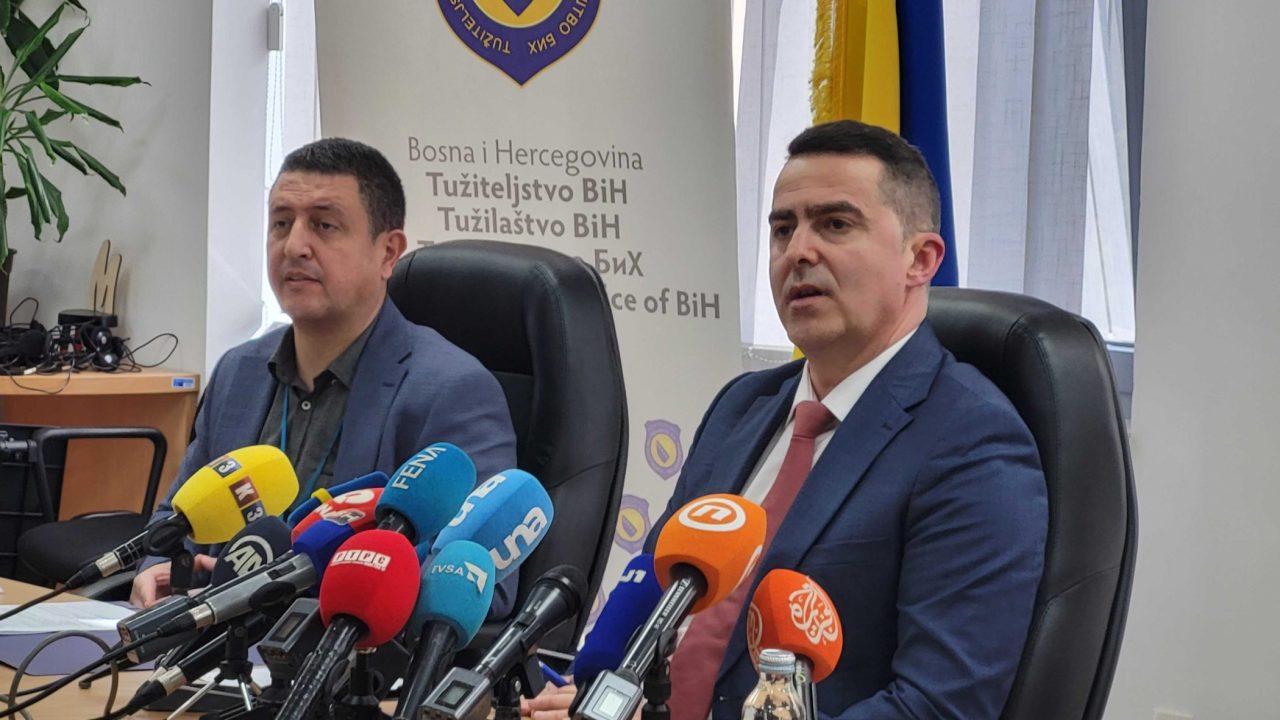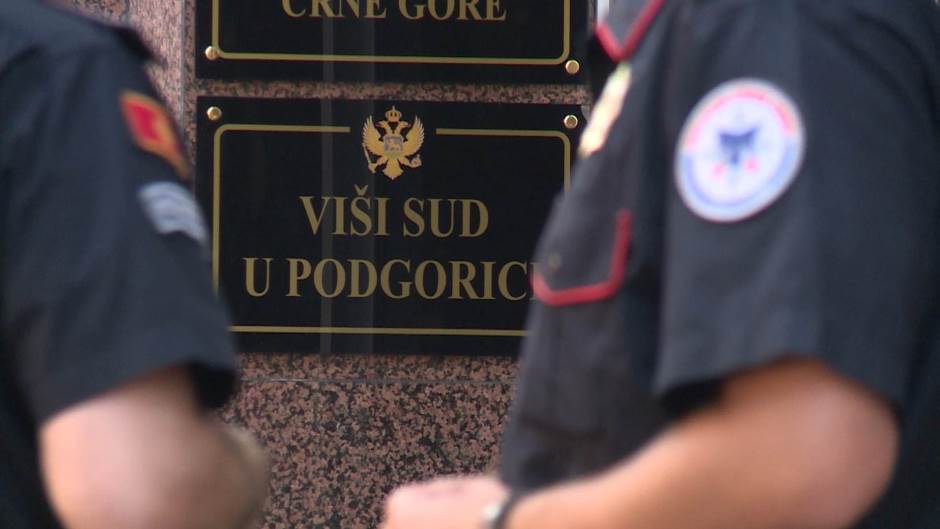This post is also available in: Bosnian
“He was powerful and influential in Hadzici.” This is how Almin Dzelilovic remembers Zoran Gasovic, a police officer in the Hadzici area near Sarajevo, who was involved in the abuse of Bosniak and Croat detainees at a Serb-run detention facility during the war in Bosnia and Herzegovina from May 1992 onwards.
“He took detainees out of the Garaza detention camp, which was situated in the municipality building, for interrogation and mistreated them physically,” recalled Dzelilovic, president of the Not to Be Forgotten and Repeated 1992-95 Detainees’ Association from Hadzici.
Gasovic has been charged in Montenegro with a crime against humanity. More than 80 people from the Hadzici area have given statements to the Montenegrin Special State Prosecutor through the Bosnian police and judicial authorities during the investigation.
When he was arrested, in December 2023, Gasovic was working as a police officer in the city of Niksic.
Dzelilovic insists that Gasovic has a serious case to answer. “He should know about [war victim] Kasim Sehic-Durmisevic, who, according to people’s statements, he took out of Garaza – and who has been missing without trace since,” he said.
Gasovic is not the only Bosnian war crimes suspect being prosecuted in Montenegro.
The Higher Court in Podgorica is also conducting proceedings against Slobodan Pekovic, formerly Slobodan Curcic, whose case was transferred from Bosnia to Montenegro.
The indictment accuses Pekovic, then a member of the Bosnian Serb Army, of having killed two civilians and taken part in the rape of one Bosniak woman in eastern Bosnia’s Foca municipality in 1992.
Bosnian war victims hope that, by giving testimony to the Montenegrin authorities, they can finally obtain justice for crimes committed during the 1992-95 war – and prevent the perpetrators from enjoying impunity because they do not live in Bosnia.
A European Union membership candidate, Montenegro has been repeatedly criticised by the EU for not doing enough to prosecute 1990s wartime offences.
But, after a new war crimes strategy was adopted in 2024, a decision by special prosecutors in February to reopen four war crimes cases was welcomed in Bosnia – although the challenges involved in bringing the cases to trial after so many years remain significant.
No time limit on prosecutions

Almin Dzeliloivc. Photo: Detektor
Regardless of the passage of time, courts in both Bosnia and Montenegro are obliged to prosecute war crimes as international law states that there is no statute of limitations for war crimes, according to TRIAL International, an NGO that works on countering impunity for international crimes.
“It is a challenge to prosecute those responsible 30 years after the war but we believe that prosecuting them is one of the key conditions for achieving justice and accountability in society in the former Yugoslav countries,” Samra Cardakovic, legal adviser at the TRIAL International office in Bosnia, said.
“The key challenge is to gain the trust of victims … in judicial institutions, as well as in the rule of law itself,” Cardakovic added.
Bosnia’s state prosecution says about 250 people involved in various stages of proceedings in war crimes cases are living outside Bosnia in the former Yugoslav republics of Serbia, Croatia and Montenegro.
The number of suspects and indictees living in Montenegro is least of the three countries.
Bosnia’s chief state prosecutor, Milanko Kajganic, said recently that 15 war crimes cases were transferred to judiciaries in neighbouring countries in 2024 – eight to Serbia and six to Croatia.
Ana Perovic Vojinovic, a prosecutor at the Montenegrin Special State Prosecutor’s Office, believes Montenegro’s inter-state protocol with the Bosnian prosecution on cooperation on war crimes, crimes against humanity and genocide cases needs to be revised.
The protocol, agreed more than a decade ago, states that “the fact that one party has undertaken criminal prosecution does not prevent the other party in whose territory the criminal offence of war crime was committed from prosecuting the perpetrator of that crime who found himself in its territory, or from seeking [the extradition of] that person from other countries, until the case becomes a judged matter”.
However, this means that the same person can be prosecuted for the same crime in both states, which Perovic Vojinovic calls inefficient.
“This is even more so because there is a justified question over the use of same evidence for the same criminal offence in two countries,” she said.
Poor cross-border judicial coordination

Milanko Kajganic, chief prosecutor of the Prosecutor’s Office of BiH & Boris Grubesic, spokesperson for the Prosecutor’s Office of BiH . Photo: Detektor
The Bosnian state court has confirmed that there have also been cases in which cooperation was ineffective due to unharmonised legal frameworks between countries’ judicial systems.
“Sometimes, there are delays in people’s extradition, or in the process of fulfilling requests for international legal assistance,” it said.
“In several cases, war crimes suspects were in Montenegro for a long time and the extradition procedures were not sufficiently fast and efficient, slowing down the procedure and allowing for avoidance of accountability,” the court added.
Three years ago, a wartime fighter from Montenegro, Miodrag Nikacevic, was indicted in Bosnia and Herzegovina for crimes against humanity.
He is accused of persecuting civilians in the Foca area of Bosnia in 1992. But the indictment papers were not served to him because he was not found at his address in Montenegro.
The Bosnian state court said Nikacevic was avoiding criminal prosecution. It said the Basic Court in Pljevlja had previously informed it that the indictment was not served to Nikacevic because, according to locals, he was not in Montenegro. A request was then sent to the authorities in Serbia to serve the indictment.
Nikacevic had already been sentenced in Bosnia to ten years in prison in 2009 for crimes against humanity in the Foca area, for raping two Bosniak women.
In 2020, another Montenegrin citizen, Ranko Radulovic, was charged by the Bosnian judiciary with wartime rape in Foca. Radulovic appeared at the Higher Court in Podgorica and pleaded not guilty via video link, but his trial has still not begun.
The Montenegrin judiciary issued a warrant for his arrest on the rape charge and he was detained in Belgrade, Serbia on March 26 this year. Montenegro requested his extradition on April 5.
Sometimes cross-border cooperation problems go in the other direction.
Bosnia’s state court in 2021 rejected a request by the Montenegrin judiciary to take over enforcement of the 20-year prison sentence imposed on Radomir Kovac for crimes in Foca following a trial in absentia.
In 1996, Kovac was convicted, along with Zoran Vukovic, Zoran Simovic and Janko Janjic, of the murder in July 1992 of three members of the Klapuh family, who they had previously promised to transport from Foca to Podgorica for money so they could escape the Bosnian war. An arrest warrant was issued but Kovac did not spend a day in prison.
As well as serving the interests of justice, TRIAL International notes that ensuring the prosecution of suspects via regional cooperation is important for Bosnia’s own EU membership bid.
“The European Union demands a more proactive approach to prosecutions – but also to protecting witnesses and ensuring the impartiality of the judiciary,” Cardakovic said.
This article was produced as part of a project implemented by TRIAL International in cooperation with Human Rights Action from Montenegro.



